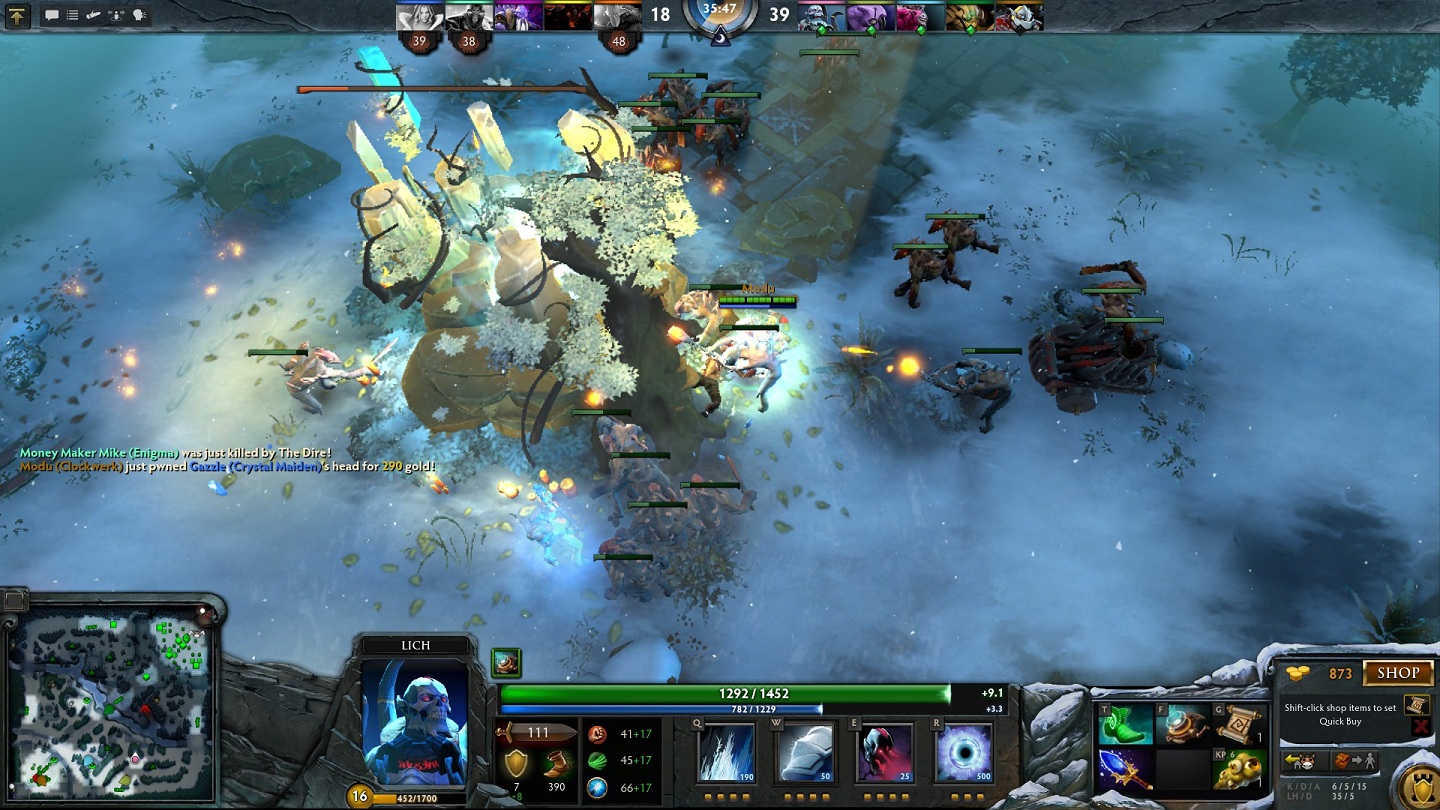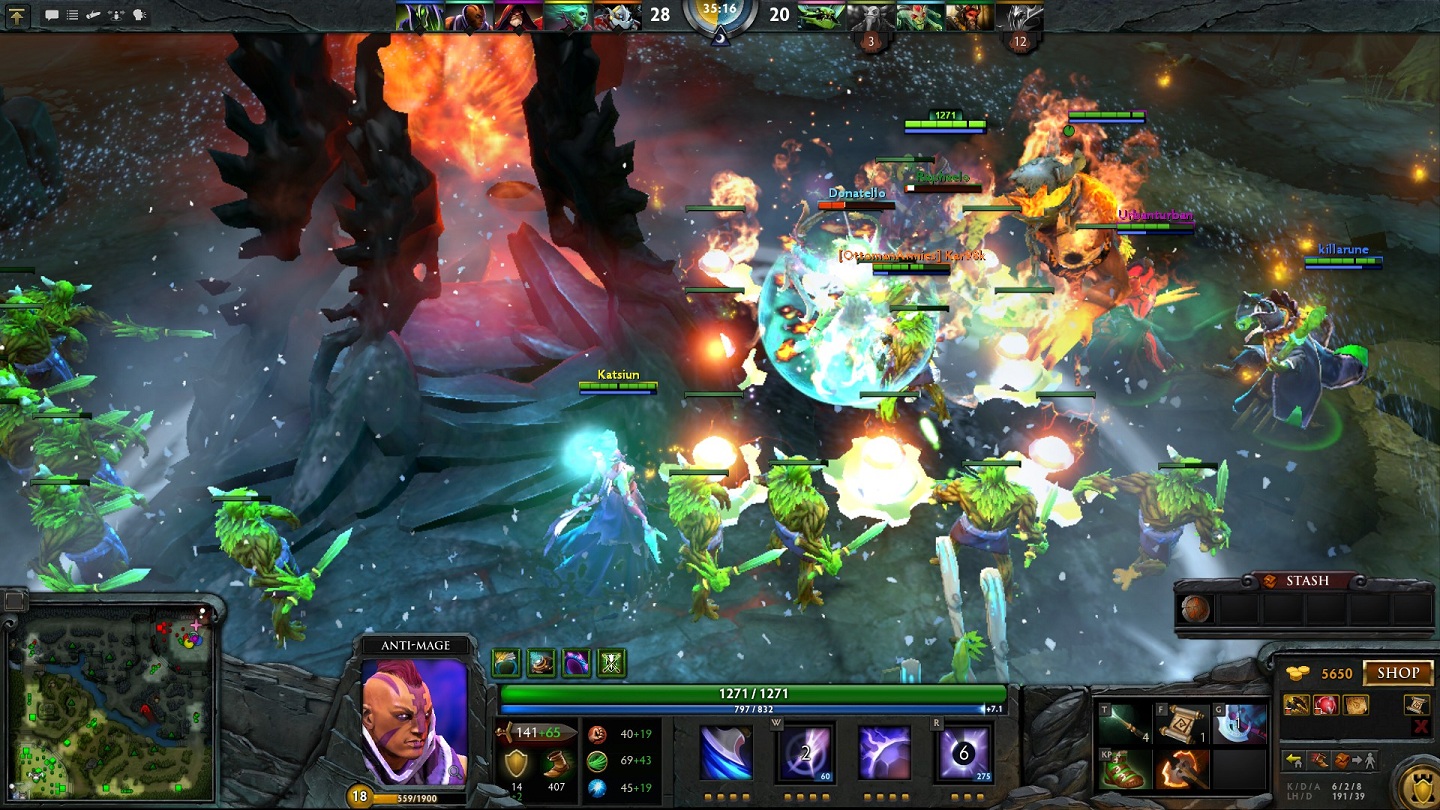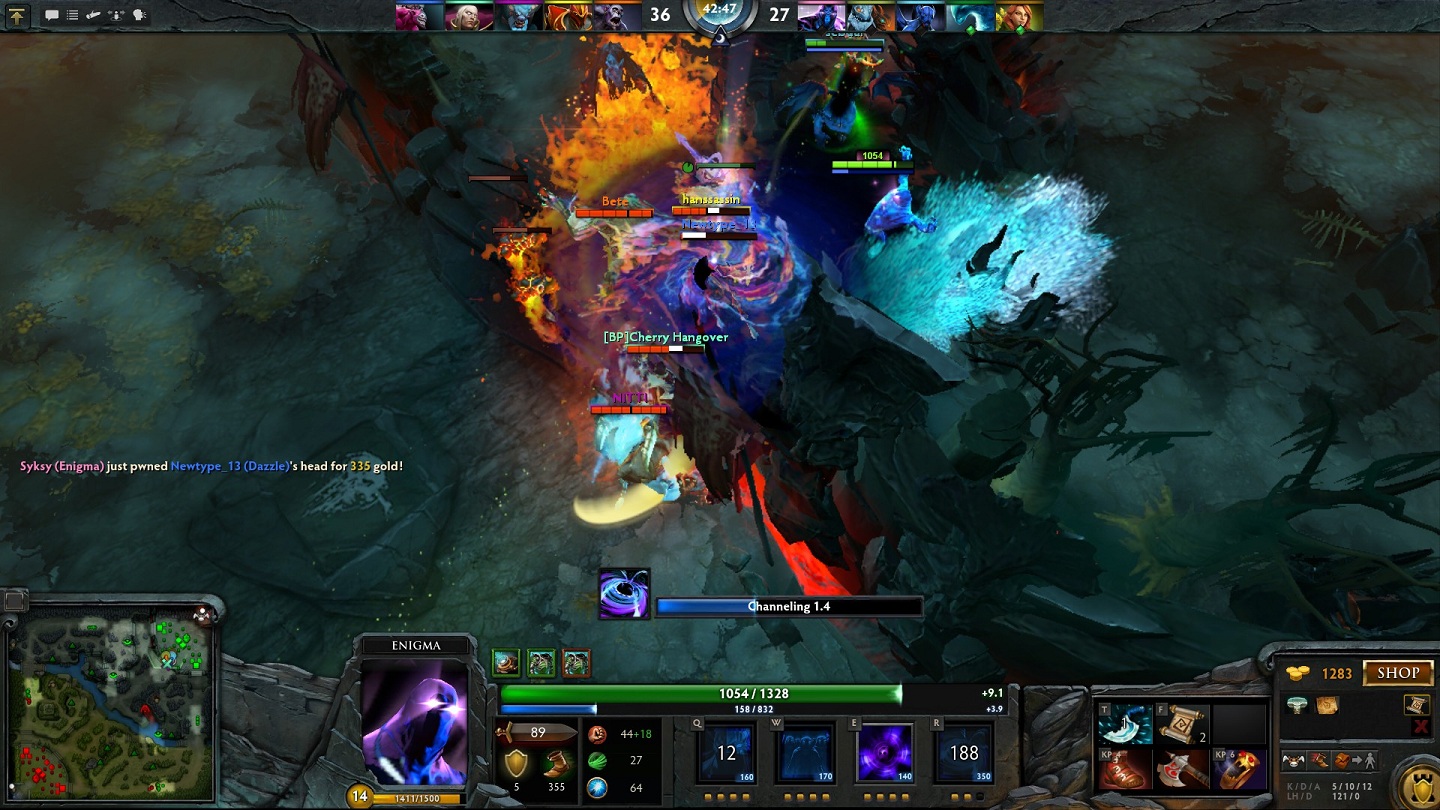Search
[{{{type}}}] {{{reason}}}
{{/data.error.root_cause}}{{{_source.title}}} {{#_source.showPrice}} {{{_source.displayPrice}}} {{/_source.showPrice}}
{{#_source.showLink}} {{/_source.showLink}} {{#_source.showDate}}{{{_source.displayDate}}}
{{/_source.showDate}}{{{_source.description}}}
{{#_source.additionalInfo}}{{#_source.additionalFields}} {{#title}} {{{label}}}: {{{title}}} {{/title}} {{/_source.additionalFields}}
{{/_source.additionalInfo}}DOTA 2

DOTA 2
Developed by: Valve
Published by: Valve
Release Date: TBA
Available on: Windows, OS X (Digital distribution over Steam)
Genre: Multiplayer Action RTS
Number of Players: 1 to 10 with bots
ESRB Rating: Online interactions not rated
Price: Early beta access $30, free when released or if one obtains a beta key
DOTA 2 is Valve's newest addition to the lane pushing genre, which include games such as League of Legends (LoL) and Heroes of Newerth (HoN). The genre was basically founded by the prequel, Defense of the Ancients, which is a user-created mod for Warcraft III and has been reported to be one of the the most popular mods in the history of gaming. This genre involves heavy multiplayer emphasis, where each player controls a single hero with a small set of skills, typically 4, and unlike typical RPGs, every player starts with no gear and level 1 at the start of every new game. The map is always the same, with only minor adjustments, and it pitches 5 heroes against 5 heroes in a quest to bring down the opposing side's base. Non-player controlled characters (called creeps) from both sides will automatically spawn and advance towards the opposing side, while player interference seeks to disturb this delicate equilibrium.
Lane pushing games have been briefly described as Action RTS (Real-time Strategy). While players with experience in RTS games might initially find controlling a single hero rather simple, this perception will prove to be false. I had not played lane pushers before DOTA 2, which I started approximately half a year ago as I was provoked by a group of friends, and I must admit that most of my prejudices against this genre were shattered. Most of all, the genre is by no means simple. The learning curve is very steep, and even after 1,000 hours of gameplay, almost every new game gives me new insight into the mechanics of the game, and helps me strive to become a better player. In essence lane pushing games provoke the player to battle against him or herself in a quest to improve, as there is no accumulated advantage from previous games except for pure gameplay skill.
The financial model of DOTA 2 is going to be Free 2 Play (F2P) once the game is released (hopefully some time in 2013). The game is now in early access beta, with purchasable access to the game itself (30$). However, there are a lot of beta pass keys passed around, and one may find people with additional beta keys rather easily for free. Valve's in-game store offers player-made cosmetic content for each of the heroes, although such items are also randomly awarded to players after successful ranked matches. Additionally, some DOTA-scene items are also available in the store, such as season passes to watch tournament games of professional competitive gameplay. One of the biggest concerns over the financial model of DOTA 2 has revolved around it becoming a "Pay 2 Win" game, that is a game where players could buy in-game content that would enhance their gameplay performance, but Valve has repeatedly stated that the purchasable content will not give a gameplay advantage. The game has already become the most played game on the digital distribution service Steam, which is quite an achievement considering that the game is still in beta. The game could be considered a late-stage beta at the moment, meaning that the game is practically finished. I have encountered only one severe bug: the cursor occasionally disappears on AMD graphics cards for many players, including me, but I am optimistic that this problem will be fixed in the final product.
The average game takes about 45 minutes, and during a match a player should not disconnect or go away from their keyboard as this will severely impair his or her team. Each side will pick from several hero categories: Carries that will attempt to generate more money than the opposing team's Carries to outmatch in the late game (thus "carry" his or her team to victory), Supports that will help Carries farm and help their team accumulate more kills, gold and experience, and Gankers that will roam the map and attempt to catch enemy heroes off guard (Ganker is a term for a hero that uses skills to surprise attack the enemy team to gain a temporary unfair advantage for his or her team). The skill sets of each hero are unique, and thus each game will be unique as each team will have a different combination of 5 heroes that can be chosen from a pool of approximately 80 heroes. Most new additions to the game itself include new heroes along with cosmetic items created by the community. Some heroes are easier for new players to get into, while others will require tens to hundreds of hours of training in order to be played reasonably. Generating money is mostly done by striking the finishing hit on a creep or a hero, which yields an extra pile of gold, and timing and situation awareness for performing these finishing blows is probably the most important game mechanic for a new player to practice.

Strong Points: Interesting mechanics, possibility to improve, team-work orientated multiplayer experience
Weak Points: Appalling online community, very intensive gameplay
Moral Warnings: Brutal online text and voice chat, lore contains some questionable elements
Graphics-wise DOTA 2 delivers a satisfying experience, as the enhanced Source engine performs well in comparison to the graphics engines of other Action RTS games. However, the visual aspects of the game are not really a necessary part, as the game is so fast paced that one does not have time to gaze upon the beauty of the Warcraft III inspired fantasy map. There are minor blood spatters, and some of the female heroes fall prey to the fantasy genre cliché of suggestive clothing. Some visual effects are essential for the gameplay in order to keep track of skills and situations going on in the map, and sound effects may also deliver useful information. Heroes have fun punch lines in the audio effects, and often I stopped to think about how clever some hero dialogues had been. Such immersive aspects combined with the variety of hero mechanics, and hero cosmetic customizations, contribute to people growing fond of certain heroes, and many players adapt so-called signature heroes over time.
DOTA 2 is highly competitive as it offers a rather steep learning curve. Perfect timing, situation awareness, a knowledge of your own and opposing heroes, and micromanaging are essential for a competent DOTA 2 player. I think the best way to play the game is to strive to improve, instead of blindly staring at statistics such as kills, deaths and assists, or gold or experience per minute in a match. Many players will have issues with ego-centric attitude, and most desire to be the Carry in the spotlight, capable of annihilating even the whole 5-man opposing team late in a match. The less rewarding roles, for example playing a Support that only helps a Carry hero achieve such a state, are often neglected. I have noticed that the most successful teams value all players - it is a 5 versus 5 game after all, and a single player will win not a DOTA 2 match without the help of his or her teammates. An out-geared Carry will have always had to rely on the team to help reach that goal.
The eSport (electronic sports) scene revolving around the Action RTS genre greatly interests me. In Summer 2011 I watched eSports for the first time by checking out the finals of International 2, which is the largest tournament of DOTA 2 with a grand prize of 1 million dollars. We put up Voice over IP (VoIP) with a few friends to watch matches and surprisingly I found it amusing to just watch others play. I can imagine that in the future people of our generation will sit down with friends on a sofa to watch DOTA-likes, instead of turning the TV channel to NFL, NBA or NHL. It is entertaining to watch the best in the world, who display such situation awareness and skill that I could only envy. This is the salt of the game; with every passing game I can still progress to improve, but I can not do this alone as I have the rest of my team to play with. The genre, in my opinion, bears resemblance to many actual sports: there are superstars in the scene, who everybody knows, there are different roles in the games (like offensive, defensive, support, finisher), one has to practice good strategies, and finally it lays foundation for a great hobby that bears great passion - something that even allows becoming a professional eSports player, given the required skill and dedication.

Higher is better
(10/10 is perfect)
Game Score - 90%
Gameplay - 19/20
Graphics - 8/10
Sound - 9/10
Stability - 4/5
Controls - 5/5
Morality Score - 60%
Violence - 7/10
Language - 6/10
Sexual Content - 8/10
Occult/Supernatural - 6/10
Cultural/Moral/Ethical - 3/10
Considering that a match relies heavily on optimal team work, it is rather surprising that DOTA 2 and apparently the whole Action RTS genre has the single most appalling online community that I have ever encountered during the good 15 years I have been online. Even if most of the players in the games act civil, in most of the games there are people who are whining, insulting and even sabotaging their own team, just out of sheer malice and disappointment over a bad game. Trash talking occurs often, usually when the offending player's team is losing. These players often blame everyone else, call their teammates foul names and spit ethnic slurs at everyone involved. Valve has acknowledged the bad habits of the lane pushing games, and the game comes with built-in features of either commending or reporting a player. Few times upon logging in I have received an automated message from Valve saying that they have taken action against a player that I have previously reported, thus it would seem that Valve even actively seeks to improve the community. I have somehow become a little accomodating to the rude behaviour so far, but at first it was surprising, as even in online FPSes people seem much more kind.
In European servers people have significant prejudices against Russian players, which I find very sad. Young people from such nations apparently often write in cyrillic alphabets, and these people accumulate a lot of hatred due to others not being able to understand them. I myself try not to be bothered by cyrillic speech, although it does make it hard to understand what type of gameplay they would wish of me. Usually a kind request to switch their language to English does the trick. Similarly, in US servers there seems to exist discrimination against Brazilian players. I have to underline, that there are all kinds of people of all nations; I have befriended both Russians, and latinos, and I have as well met people from such countries that I have not liked. But the bottom line is, I can still try to get along with them. It is much like the Church; there are people we get better along with, whom we bond with closely, and then there are those who we do not really get along with - but for the sake of peace we still do. Similarly, I have met people from my native country (Finland) in DOTA that are acting in such an arrogant and insulting manner, that it has made me ashamed to call myself Finnish. I would wish Christians playing DOTA or similar games to act in a blameless manner and to improve the community from inside. It does not help to get judgmental or self-righteous, and I acknowledge that the hostile attitude is rather contagious, but this sinful in-the-moment behaviour does not help anybody. In fact, I would claim that people with racial slurs or blaming behavior have a lower win percentage simply because of the malicious behaviour towards their fellow players.
Spiritually DOTA 2 can be quite exhausting, mostly due to the fact that people tend to be verbally abusive and the competitive mood of the game may strike surprisingly hard. In particular, I would not suggest DOTA 2 to people that tend to get carried away by competitiveness in sports. Firstly, it has a great chance to be over-addicting, something that it has been to me. Secondly, DOTA 2 has a chance of not being edifying, as the mood of the game is generally malicious, and may provoke explicit behavior. I started DOTA 2 with a group of Christian friends from my University, and quickly I noticed that for some of the people from our group the game was not suitable. Although the friends were civil enough not to be openly bickering at each other, long sighs and stingy comments over VoIP gave out the impression that people were not at all pleased at each other over a lost game. And if this was among Christians, you can only imagine the mood that goes among secular, randomly assembled teams. The worst thing is, as I progressed in skill and quickly became one of the best among our group, I could notice myself also getting frustrated at a less skilled friend that rarely sees the optimal way to play a situation. Realizing this forced me to try to rid myself of any elitism that may creep in and to consciously always maintain an attitude of humility and friendly behavior, and I noticed that making a conscious choice really helps my mood, as well as makes it easier to maintain a friendly mood with whoever I am playing with. The hardest part in this actually relates to grace; even if we were absolutely right in a situation, playing blamelessly and ironically even being insulted by a player that was clearly losing the game for us, it is grace not to use that "right to be right". Instead be gracious like Christ, who showed his love to the world, as we were yet sinners He died for us, wearing a humble and calm attitude. By remembering this, we may forgive and act in meekness even when being abused. (Romans 12:14-16: Bless those who persecute you; bless and do not curse them. Rejoice with those who rejoice, weep with those who weep. Live in harmony with one another. Do not be haughty, but associate with the lowly. Never be wise in your own sight.)

The game lore itself contains some elements that could be considered spiritually questionable. The world of Warcraft III has been an obvious inspiration due to the origin of the DOTA 1 mod, and thus there are demons, wizards, and other fantasy folk in the game. For example some heroes may summon demonic minions (controllable monsters) and some have abilities to e.g. banish a hero to a demonic realm (that is, stunning and removing the hero from play for a few seconds). Although one might argue that such lore could be potentially of harmful influence, the lore is so vague and non-essential to the gameplay, that I would consider it irrelevant. Players hardly stop to think about any background information on the particular heroes, let alone remember the names of the heroes. The two sides of the map, Dire and Radiant, have a vague correspondence to hell and heaven, but any hero can be played on either side and the sides are identical except for the sound and graphics theme. I would consider the player interactions to be much more important in this spiritual respect.
A comment from the opposing team during Christmas time captures the current spirit of the game: "stop being so nice, I came to play DOTA". In DOTA 2 kindness really stands out. For example, random people are often surprised whenever I comment to them "no problem mate, happens to everybody" if they really mess up a particular situation and basically cause us to lose a major fight and possibly the whole game. Doing this I have received some friend requests on Steam and have gained gaming friends that I regularly play DOTA 2 with. Similarly, I am thankful whenever somebody else shows empathy when I do mistakes - and everybody will do them especially in a game like DOTA 2 where every situation is over in a blink of an eye and little things matter extensively. As Christians I believe we should stand out firstly due to our positive social impact, and only secondly due to our skill or other gaming factors. Witnessing through actions works favorably, and is something I believe is highly encouraged by the Bible (Ephesians 5:4 Nor should there be obscenity, foolish talk or coarse joking, which are out of place, but rather thanksgiving.; Romans 14:19 Let us therefore make every effort to do what leads to peace and to mutual edification.)
Overall, DOTA 2 sets the new standards for lane pushing games. According to the tradition of such games, the community poses an obstacle for new players, although the future Free 2 Play model may prove to improve this aspect. Until then, one needs to have a good bunch of self-esteem and thick skin in order to enjoy a gaming experience among the passionate DOTA 2 players.






